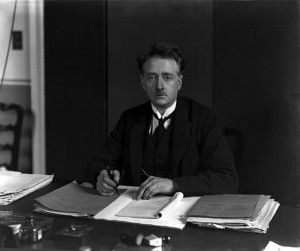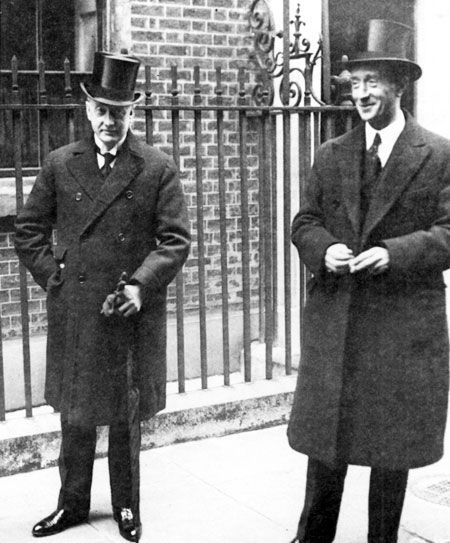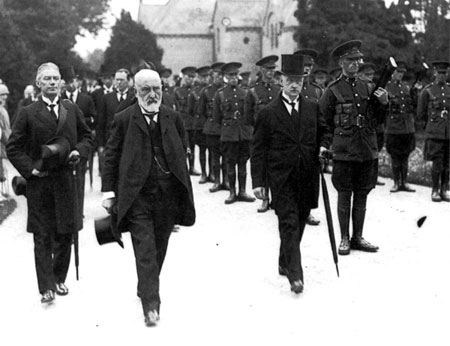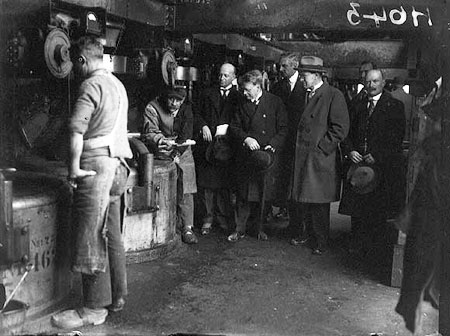William T. Cosgrave
by Stephen Collins
Cosgrave deserves a lot of the credit for putting Irish democracy on a firm footing. It is remarkable to think that Ireland is now one of the oldest democracies in the world, even though it is just over 80 years old. Yet despite his role in establishing our fledgling democracy Cosgrave is not nearly as well known as either Collins or Griffith. Partly this is because of his elusive personality but I believe it is also due to the fact that he was essentially a politician. We find it much harder to elevate a genuine politician to hero status than an urban guerrilla leader like Collins. or a life-long anti-establishment campaigner like Griffith. So who was the man who was acclaimed as leader of Cumann na nGaedheal at the first national convention of the party in the Mansion House 80 years ago?.
On the day he was ratified by the Dail as president of the Executive Council on 9 September, 1922, the Irish Times published a perceptive profile of W.T which captured the essence of the man. It is worth quoting a bit. ”Mr W. T. Cosgrave is a man who has succeeded very well in keeping out of the limelight of publicity. That perhaps is his best title to fame but he has other qualities in addition to his modesty and is regarded by those who know him as one of the soundest men in Ireland today. It would be hard to imagine anybody who is less true to what we used to consider the Sinn Fein type than Mr Cosgrave. It is not only that he does not dress in the regulation way —- trench coat. leggins and slouch hat and the rest of it; but he has a thoroughly Conservative face.
He is neither a wild—eyed revolutionary nor a lank—haired poet. He dresses generally in sombre hues. wears a bowler hat and looks rather like the general manager of a railway company. To understand how this modest man arrived at the position where he was chosen by a government of successful revolutionaries to succeed such powerful characters as Griffith and Collins it is necessarily to take a brief look at his background and career. W.T. Cosgrave was born in Dublin in 1880. His father was a publican and grocer at 174 James Street. W.T. grew up in a reasonably comfortable lower middle class background in the last two decades of the 19th. century. He was educated by the Christian Brothers and left school at 16 to work in his father’s business. His lack of higher education was something he came to regard as a drawback in later years but he was happy enough at the time to leave school to work in the family business.
The tangible memorial to Cosgrave’s influence on the City Council was a decision he initiated to build Corporation housing estates in the city. One of these developments was the estate now known as Ceannt’s Fort in his home area. W.T. later told Ernest Blythe that in his actions on the Corporation he was “a little bit of a leftist.” Although he can hardly have anticipated it at the time. His role as a reforming politician on Dublin Corporation gave W.T. a very good training for life as a political header in independent Ireland. It also helped to save his life after the 1916 Rising when his political reputation played a part in having his death sentence commuted. Side by side with his activity in local Dublin politics Cosgrave continued his involvement with the Irish-Ireland side of Sinn Fein. The Sinn Fein newspaper records his attendance at the weekly meetings of the Craobh Eamonn Mhic Gearailt branch of Sinn Fein which were held in the family premises at James Street. Griffith was a frequent guest speaker at branch meetings while Cosgrave himself regularly spoke at them.
Even at this stage he didn’t waste words and in a style which was to become characteristic of him he preferred to make short, pointed and witty’ contributions rather than engage in the long-winded oratorical type of speech so common at the time. W.T. became a significant figure in nationalist policies and when the Irish Volunteers were founded at the Rotunda in Dublin in November 1913 by Eoin MacNeill he was among the dignitaries on the platform alongside Padraig Pearse. He stayed with the Irish Volunteers after the split in 1914 but interestingly he refused a number of overtures to join the secret Irish Republican Brotherhood. A revealing insight into his character and his attitude towards public life is gained from an incident in the Spring of 1916 which is recorded in the files of the Military Archives Bureau which have just been opened to the public.
Cosgrave in his detailed statement to the Bureau records a meeting with Thomas McDonagh not long before Easter 1916 when the poet asked him what he though about the idea of a Rising. I told him it would be little short of madness as we lacked men and munitions. I was not impressed with gaining a moral victory; while there was a certain glamour in maintaining a succession of Risings against British domination, our policy should be directed towards leaving things better than we find them.” Cosgrave gave this account of events in 1949 when it was not at all fashionable, as it became a few decades later, to throw cold water on the notion of blood sacrifice and moral victories. Despite his reservations he took part in the 1916 Rising as a lieutenant in the fourth Dublin Battalion under Comdt. Eamonn Ceannt and was part of the garrison at the South Dublin Union, now St James’s Hospital. In the aftermath of the Rising, W.T. was sentenced to death but had his sentence commuted. The prosecuting counsel, W.E.Wylie gave an interesting account of the court-martial some years later. In January, 1917 Dublin City Council passed a motion calling specifically for Cosgrave’s release. “Mr Cosgrave was the chairman of the Finance Committee and had won the respect of every man who had met him. Would anyone seriously suggest for a moment that Willie Cosgave was a criminal?” read the motion.
Cosgrave didn’t just oppose de Valera at Cabinet, he came out in the open in the Dail on 14 September and objected to the decision. He told the Dail that “this was a team they were sending over and they were leaving their ablest player in reserve. Now it was not usual to leave the ablest players in reserve. The reserve would have to be used some time or other and it struck him now was the time they were required.’ Because of his years of political experience Cosgrave seemed to have a shrewder idea of the dangers of Dev’s strategy than the others at the cabinet table. He showed the same skills when it came to the signing of the Treaty in December. 1921. De Valera decided to reject the agreement in the belief that he could carry a majority of the seven-man Cabinet with him. Cosgrave suddenly found himself in a pivotal role as they waited for the three Cabinet members, Collins, Griffith and Barton. who had signed the Treaty, to return home from London.
Three others de Valera, Stack and Brugha were strongly opposed to it; Cosgrave was the man in the middle. De Vahera decided on a pre-emptive strike before the signatories even came home and he called a meeting of the four Cabinet Ministers who were in Ireland. When the Cabinet met on 7th. December de Valera announced that he was going to sack the three Ministers who had signed the Treaty. Stack and Brugha had no hesitation in supporting de Valera but Cosgrave. who carefully avoided expressing any view one way or another on the merits of the Treaty, surprised his three colleagues by maintaining that it would be wrong to condemn the delegates without a hearing. de Valera was taken aback by Cosgrave’s opposition to his proposed sacking but he conceded that the three deserved a hearing and agreed to postpone a decision until they had returned. He took this cautions approach in an attempt to keep Cosgrave on his side so that he could outvote the three plenipotentiaries when they returned.
At the critical Cabinet meeting when the three had returned Cosgrave threw in his lot with the signatories and the Treaty was approved by four votes to three. His practical attitude to politics was again in evidence during the bitter DaiI debate on the Treaty that followed when he was one of the very few TD’s to raise the question of Northern Ireland. “One question that has not been put at all is this: If you could have a choice for a Republic with twenty six counties, would you have it or a Dominion for the whole of Ireland. If such a choice were put up my money would be on the Dominion, not per se on the Dominion, but because it would effect that unification that ought to be effected in Ireland.” In the Provisional Government that followed the Treaty Cosgrave continued to run the Department of Local Government. Collins insisted that “Cosgrave and his oil can” should come with him to tense negotiations with British Ministers during the first half of 1922.
When Griffith and Collins died within ten days of each other in August, 1922, Cosgrave emerged as the unchallenged successor as president of the Executive Council. Not everybody was happy at the development. The biographer of Kevin O’Higgins, Terence de Vere White, says that while O’Higgins favoured Mulcahy the support for Cosgrave was so strong that he withdrew his opposition. O’Higgins, though, is reputed to have sneered that “a Dublin corporator would make Ireland a nation once again.” However, as the Civil War raged the “Dublin corporator” showed that he was made of stern stuff. On the day he was ratified by the DalI as president of the Executive Council he spelled out his credo. “It is my intention to implement the Treaty as sanctioned by the constitution, to assert the authority and supremacy of parliament, to support and assist the national army in asserting the people’s rights, to ask parliament, if necessary, for such powers as are deemed essential for the purpose of restoring order to suppress all crimes, to expedite as far as lies in the power of the Government the return of normal conditions throughout the country.”
Persons robbing at the point of the gun will be executed without discrimination. This is going to be a fair law, fairly administered and administered in the best interests of the country for the preservation of the fabric of society We are going to see that the rule of democracy will be maintained no matter what the cost and no matter who the intellectuals that may fall by reason of the assertion of that right.” These were tough words indeed and Cosgrave saw the policy through to the bitter end. He refused to agree to a six-point peace plan in April 1923 because it would have involved leaving arms in the hands of the IRA. He outlined the principles which republicans would have to accept if there was to be peace.
These were: “(a) That all political issues whether now existing or in the future arising shall be decided by the majority vote of the elected representatives of the people: “(b) As a corollary to (a) that the people are entitled to have all lethal weapons within the country in the effective custody or control of the Executive Government responsible to the people through their representatives. “The acceptance of these principles and practical compliance with (b) by the surrender of arms to be the preliminary condition for the release of prisoners who shall be required to subscribe to (a) and (b).” De Valera refused to accept the terms and Cosgrave defended them to the Dail: “We have said from the very beginning that we are prepared to wipe the slate clean but we are not prepared to take any risk with regard to the possession of arms by people who do not realise their responsibilities as citizens.” Shortly afterwards came Frank Aiken’s famous order to the IRA to dump arms.
This is what he had to say: “Although William T. Cosgrave has left us, the work he has done for Ireland endures. The generosity of his youthful response to the call to serve Ireland, the privations and the sacrifices which he endured so that national freedom might be ours, the capacity’ he displayed in presiding over the administration while responsibility was his, the grace with which he handed over responsibility when the people so willed, the dignity with which he carried out his duties as leader of the opposition and later as a private member of this House, the generosity of spirit with which he lent his hand to the defence of the State in a time of national danger, the readiness with which. even in retirement from active public life, he gave of his counsel in the sphere of national development which was dear to him and, finally, the exemplary character of his long life, these are elements of a legacy which we in Ireland and indeed people who value freedom and democracy everywhere will forever cherish.”




